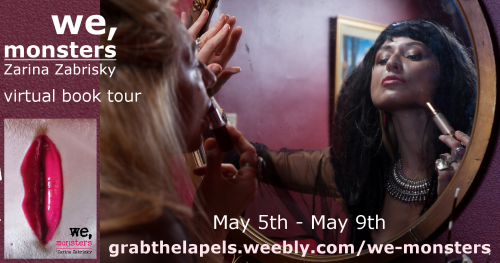
HTMLGIANT welcomes Zarina Zabrisky, author of the novel We, Monsters (2014, Numina Press). In the novel, a wife and mother searches the internet for a job as a dominatrix. She needs the experience; it’s research for a novel she’s writing about her dead sister. Taking the name Mistress Rose, she learns the darkest desires of the human psyche while slowly doubting her own perception of reality. Rose’s manuscript ends up in the hands of clinical psychologist Dr. Michael H. Strong, who adds footnotes in which he analyzes Mistress Rose’s behaviors and undoing.
As part of her virtual book tour, Zarina gives you a “Top Ten” list of what she did to write We, Monsters. The novel took seven years’ worth of research to complete:
1. Read and re-read the major works of Freud and Nietzsche. I felt that I didn’t understand most of it but loved the process. Read and analyzed articles and research work by modern psychologists to feel the style.
2. Studied Diagnostic Criteria from DSM-IV-TR (the major directory for psychiatrists). Diagnosed myself with each and every disorder and affliction.
3. Composed a glossary of Paraphilia terms.
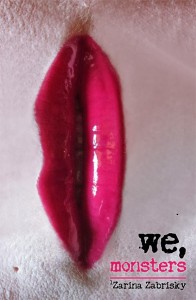 4. Wrote a fake philosophy book from the point of view Dr. Michael H. Strong to master his personal writing style. The book is called Survival and Procreation. The world will never see it.
4. Wrote a fake philosophy book from the point of view Dr. Michael H. Strong to master his personal writing style. The book is called Survival and Procreation. The world will never see it.
5. Worked as an apprentice dominatrix at a small dungeon in Oakland (for six months). It is the only job I got fired from (for insisting on wearing rubber gloves…)
6. Studied (and failed) a manual on knot-making for bondage. I suck at knots.
7. Studied architecture books and photographs on the Potemkin Stairs and the Odessa Opera Theater (I have never been inside) to create an accurate setting.
8. Watched Battleship Potemkin in detail and many documentaries about it. Cried every time.
9. For a year, studied (almost non-existent) works on female sexual fantasies. Discovered that unlike male sexual fantasies, those are astonishingly under-studied. Also, discovered that women have very diverse sexual fantasies and some elements that appeal to some women might never occur to others (kitchen objects and agricultural items, for instance, have never crossed my mind. I am not a good housewife.)
10. Learned the rules and played Lemmings, a computer game not known to me—as pretty much every other computer game still unknown to me. Lemmings are cute.
You can purchase We, Monsters here.
***
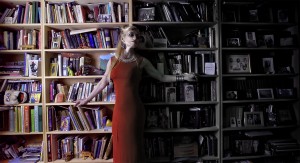 Zarina Zabrisky is the author of short story collections IRON (2012, Epic Rites Press), A CUTE TOMBSTONE (2013, Epic Rites Press), a novel We, Monsters (2014, Numina Press), and a book of poetry co-authored with Simon Rogghe (forthcoming in 2014 from Numina Press). Zabrisky started to write at six. She earned her MFA from St. Petersburg University, Russia, and wrote while traveling around the world as a street artist, translator, and a kickboxing instructor. Her work appeared in over thirty literary magazines and anthologies in the US, UK, Canada, Ireland, Hong Kong, and Nepal. A three-time Pushcart Prize nominee and a recipient of 2013 Acker Award for Achievement in The Avant Garde, Zabrisky is also known for her experimental Word and Music Fusion performances.
Zarina Zabrisky is the author of short story collections IRON (2012, Epic Rites Press), A CUTE TOMBSTONE (2013, Epic Rites Press), a novel We, Monsters (2014, Numina Press), and a book of poetry co-authored with Simon Rogghe (forthcoming in 2014 from Numina Press). Zabrisky started to write at six. She earned her MFA from St. Petersburg University, Russia, and wrote while traveling around the world as a street artist, translator, and a kickboxing instructor. Her work appeared in over thirty literary magazines and anthologies in the US, UK, Canada, Ireland, Hong Kong, and Nepal. A three-time Pushcart Prize nominee and a recipient of 2013 Acker Award for Achievement in The Avant Garde, Zabrisky is also known for her experimental Word and Music Fusion performances.


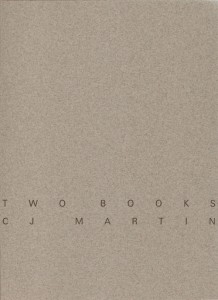
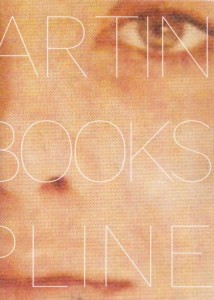
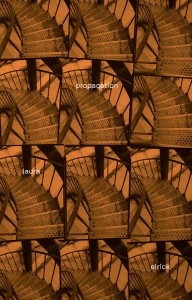
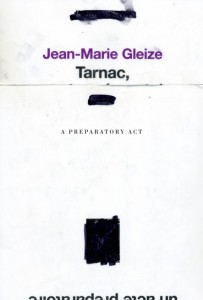
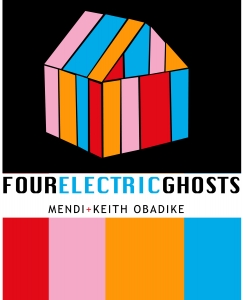
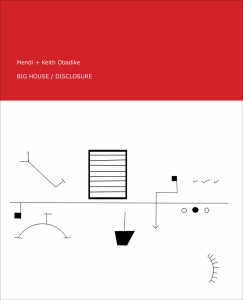
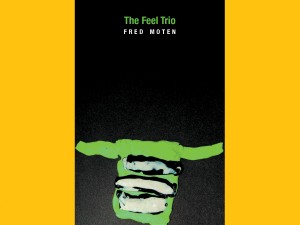

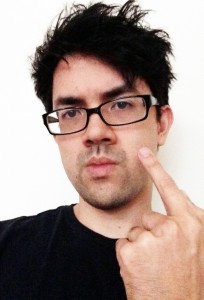
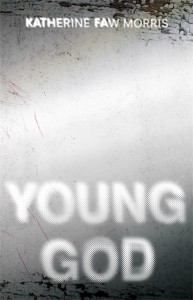 Young God by Katherine Faw Morris (May 7th)
Young God by Katherine Faw Morris (May 7th)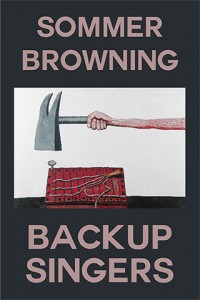 Backup Singers by Sommer Browning (June 3rd)
Backup Singers by Sommer Browning (June 3rd)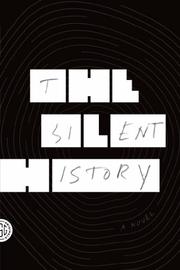 The Silent History by Matthew Derby, Eli Horowitz, and Kevin Moffett (June 10th)
The Silent History by Matthew Derby, Eli Horowitz, and Kevin Moffett (June 10th)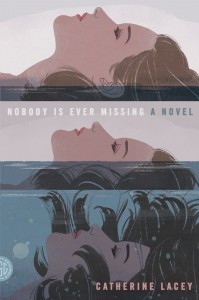 Nobody is Ever Missing by Catherine Lacey (July 8th)
Nobody is Ever Missing by Catherine Lacey (July 8th)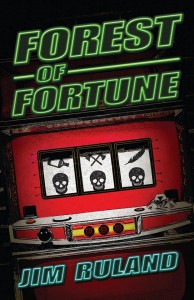 Forest of Fortune by Jim Ruland (July 31st)
Forest of Fortune by Jim Ruland (July 31st)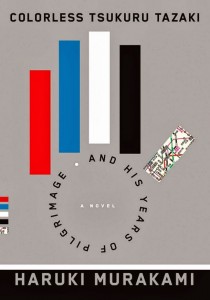 Colorless Tsukuru Tazaki and His Years of Pilgrimage by Haruki Murakami (August 12th)
Colorless Tsukuru Tazaki and His Years of Pilgrimage by Haruki Murakami (August 12th)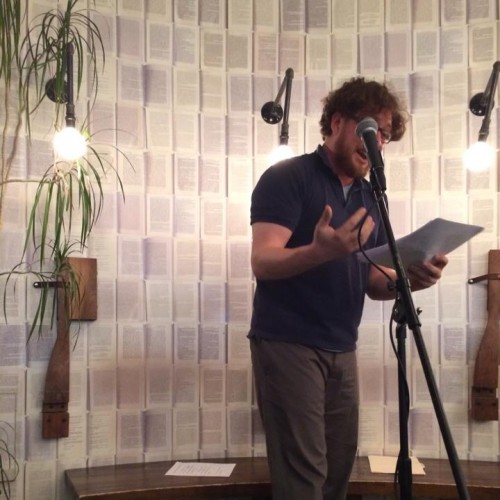
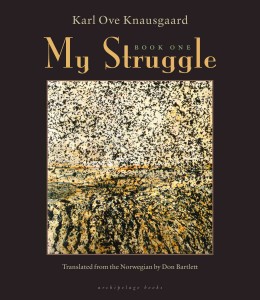
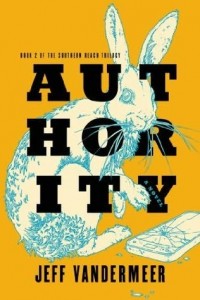
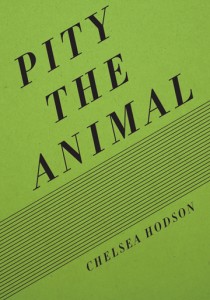
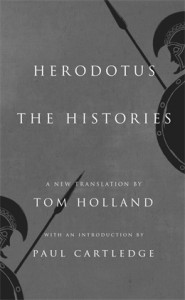
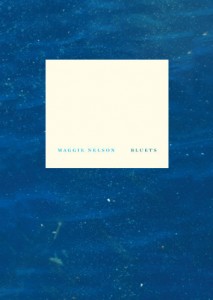
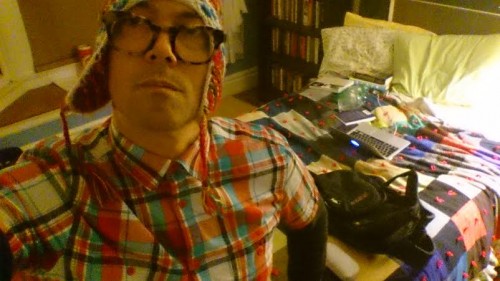
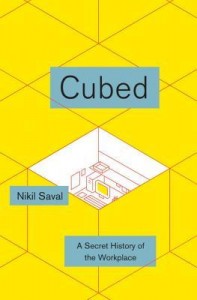 1. Cubed: A Secret History of the Workplace by Nikil Saval (Doubleday, 352pp)
1. Cubed: A Secret History of the Workplace by Nikil Saval (Doubleday, 352pp)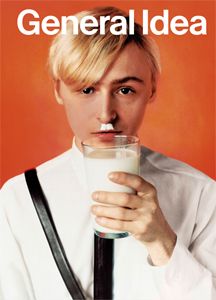 2. General Idea: A Retrospective 1969-1994 (jrp | ringier, 224pp)
2. General Idea: A Retrospective 1969-1994 (jrp | ringier, 224pp)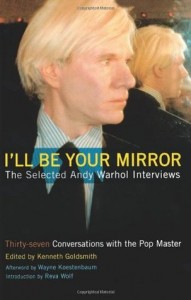 3. I’ll Be Your Mirror: The Selected Andy Warhol Interviews Edited by Kenneth Goldsmith, Introduction by Reva Wolf, Afterword by Wayne Koestembaum (Carroll & Graf, 428pp)
3. I’ll Be Your Mirror: The Selected Andy Warhol Interviews Edited by Kenneth Goldsmith, Introduction by Reva Wolf, Afterword by Wayne Koestembaum (Carroll & Graf, 428pp)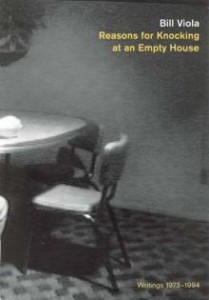 4. Bill Viola: Reasons for Knocking at an Empty House: Writings 1973-1994 (MIT, 300pp)
4. Bill Viola: Reasons for Knocking at an Empty House: Writings 1973-1994 (MIT, 300pp)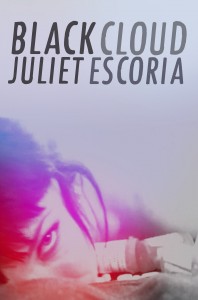 5. Black Cloud by Juliet Escoria (Civil Coping Mechanisms, 138pp)
5. Black Cloud by Juliet Escoria (Civil Coping Mechanisms, 138pp)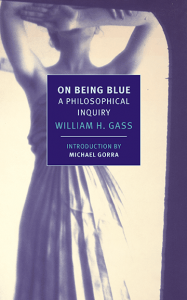 6. On Being Blue: A Philosophical Inquiry by William H. Gass (nyrb, 91pp)
6. On Being Blue: A Philosophical Inquiry by William H. Gass (nyrb, 91pp)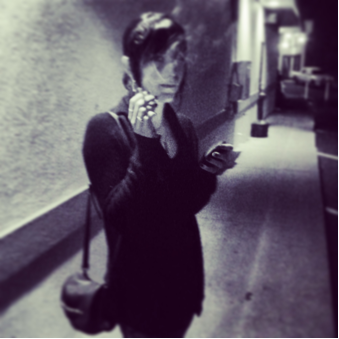
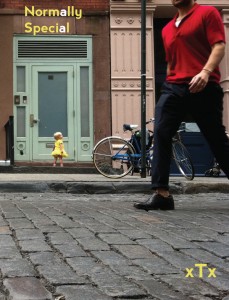 Normally Special by xTx
Normally Special by xTx The End of the Affair by Graham Greene
The End of the Affair by Graham Greene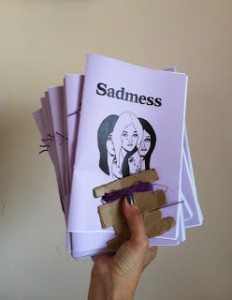
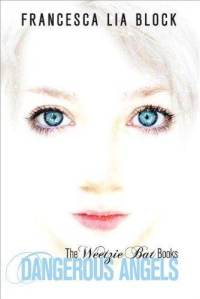 Dangerous Angels by Francesca Lia Block
Dangerous Angels by Francesca Lia Block We the Animals by Justin Torres
We the Animals by Justin Torres
 4. Wrote a fake philosophy book from the point of view Dr. Michael H. Strong to master his personal writing style. The book is called Survival and Procreation. The world will never see it.
4. Wrote a fake philosophy book from the point of view Dr. Michael H. Strong to master his personal writing style. The book is called Survival and Procreation. The world will never see it. Zarina Zabrisky is the author of short story collections IRON (2012, Epic Rites Press), A CUTE TOMBSTONE (2013, Epic Rites Press), a novel We, Monsters (2014, Numina Press), and a book of poetry co-authored with Simon Rogghe (forthcoming in 2014 from Numina Press). Zabrisky started to write at six. She earned her MFA from St. Petersburg University, Russia, and wrote while traveling around the world as a street artist, translator, and a kickboxing instructor. Her work appeared in over thirty literary magazines and anthologies in the US, UK, Canada, Ireland, Hong Kong, and Nepal. A three-time Pushcart Prize nominee and a recipient of 2013 Acker Award for Achievement in The Avant Garde, Zabrisky is also known for her experimental Word and Music Fusion performances.
Zarina Zabrisky is the author of short story collections IRON (2012, Epic Rites Press), A CUTE TOMBSTONE (2013, Epic Rites Press), a novel We, Monsters (2014, Numina Press), and a book of poetry co-authored with Simon Rogghe (forthcoming in 2014 from Numina Press). Zabrisky started to write at six. She earned her MFA from St. Petersburg University, Russia, and wrote while traveling around the world as a street artist, translator, and a kickboxing instructor. Her work appeared in over thirty literary magazines and anthologies in the US, UK, Canada, Ireland, Hong Kong, and Nepal. A three-time Pushcart Prize nominee and a recipient of 2013 Acker Award for Achievement in The Avant Garde, Zabrisky is also known for her experimental Word and Music Fusion performances.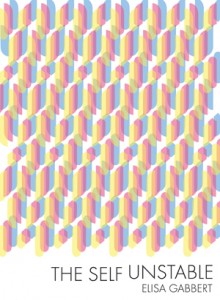 The Self Unstable
The Self Unstable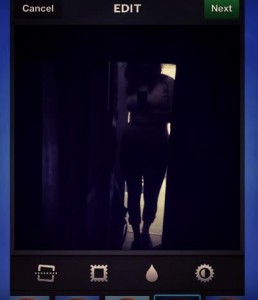 Ascension
Ascension